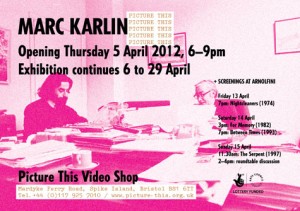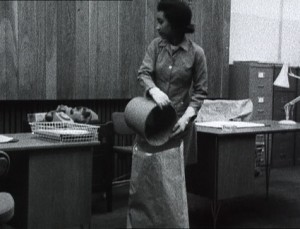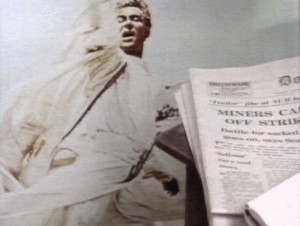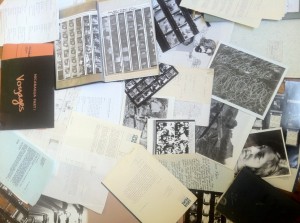Search Databases
Access Records From Our Distinctive Collections
The Angel of History: Marc Karlin
The Angel of History: Marc Karlin
Published: 10 May 2012

Last month (on the weekend of the 13th-15th April) I attended a fascinating conference in Bristol based around an exhibition and archive film screenings, which was called ‘The Spirit of Marc Karlin’, celebrating the work of the pioneering independent filmmaker. This was co-ordinated by Holly Aylett, Hermione Harris and Andy Robson. It was the one of the first outcomes of an ongoing project to secure and facilitate
See http://spiritofmarckarlin.com/ – for more information and a podcast of the conference.
Marc Karlin (1943-1999) can be described as an influential but neglected figure within the British avant-garde film culture of the post-war period. Marc began his career in the 1960s as a member of the film collective Cinema Action. He co-founded the Berwick Street Film Collective in the early 1970s, was active within the ACTT, the Independent Filmmakers Association and the Campaign for a Fourth Channel, and went on to make groundbreaking films and documentaries for both the BBC and Channel 4 during the ‘80s and ‘90s.
The retrospective began with a screening of the underground classic Nightcleaners (1974) at the Arnolfini, which was, unfortunately, shunted into a small dark room, fitted out with uncomfortable wooden chairs, due to the unexpected popularity of a dance event happening at the same time. In retrospect, perhaps this was fitting, recalling the radical non-theatrical tradition of impromptu 16mm film screenings in political meetings and factory canteens! Made by the Berwick Street Film Collective over a three-year period, this seminal documentary focussed on the women working night shifts cleaning huge office blocks in the City of London, and their struggle to unionise, with the support of the Women’s Liberation Workshop, and without the support of an intransigent and almost-exclusively male union. I won’t say too much about Nightcleaners as it has been written about elsewhere; the most recent, thought-provoking and accessible account can be found in Elizabeth Cowie’s otherwise rather inaccessible (densely theoretical) book “Recording Reality, Desiring the Real” (University of Minnesota Press, 2011). Suffice to say it remains a vital – albeit challenging – film that lingers in the memory (more on the theme of memory later).
During the Q&A session after the film, Karlin’s close colleague in the aforementioned collectives, filmmaker Humphrey Trevelyan, explained that their work for Cinema Action had involved travelling around and documenting the activities of workers (in a post-68 revival of the tradition of Dziga Vertov). By the early 1970s Trevelyan and Karlin had broken away from Cinema Action, to form the Berwick Street Collective. Cinema Action had begun to explore ways of representing

The accompanying Marc Karlin exhibition at the Picture This Video Shop, which has just finished its run, contained a display cabinet with a series of page layouts designed by Kate Hepburn for a book about Nightcleaners that was begun in 1975 but never published, and a number of production stills from Nightcleaners and its ‘sequel’ ’36 to ’77 (1978, this is shortly to be released on DVD according to Trevelyan). The other main component of this exhibition was the exhibition

Another fascinating film by Karlin which was shown at the Arnolfini film theatre as part of the retrospective was For Memory (1983). This is a truly epic documentary, in the sense of its scope, themes, form (it is just under 2 hours long), and its long gestation. It is a film about the necessity and struggle to remember, and recalls Walter Benjamin’s insistence that to remember is a political act. As Paula Rabinowitz has observed:
England was so small that those in power could make of it what they wanted – any metaphor would do – a hospital, a school, a family, a relationship – if he wanted to write a simple sentence, like ‘I love you’, he knew that he would have to filter it through the barricades of class and nation – maybe it was easier to see Trevor Howard and Celia Johnson breathe in a cinema in Paris, where both time and distance could afford their love affair the room to be singular and not be seen as part of a national neurosis. Knowing that, if images were to survive economically, they had to be sold as ambassadors of a nation. He, nevertheless, longed for that moment of silence, that illumination, that would not be sucked in by the breath of nationalism. It was precisely because England was so small that the cinema had to enlarge it – rather than sentencing images to years of national servitude….He wanted to defeat above all, those demands for a national cinema. He wanted to restore privacy.
John Wyver described the film eloquently in his obituary of Marc for The Independent (28th January 1999), after noting that Marc was simultaneously engaged in work on this project whilst participating in the Campaign for a Fourth Channel (rather than ITV2):
The historical documentary not only tells us about the past but asks us to do something about it as well – to act as the Angel of History and redeem the present through the past.[2]
Karlin actually began writing the script of For Memory in 1975, and worked on the film for a period of at least 3 years during the late ‘70s and early ‘80s. The film was not broadcast by the BBC until 1983. There was, in fact, a long period of hiatus during which attempts were made to locate the film within the Corporation after it had been finished and submitted, and in her brief introduction to the film Holly Aylett explained how this had come to light
As a fourth television channel took shape, Karlin lobbied with conviction for diversity to be at the heart of its operations; independent production, he argued, should not be just an economic idea but a cultural one too. He sought to support the different, the innovative, and he understood much about the imperatives of finding new forms to express new ideas, and about why the old ways – of speaking, of thinking, of using images – are frequently inadequate. My own first memory of Marc Karlin is from this time. I encountered him peering intently at a sequence of frame grabs from the American drama Holocaust pinned to a cork board in his chaotic office. Preparing his two-hour documentary For Memory for the BBC and the British Film Institute, he was seeking to get the frames to reveal their betrayal of barbaric acts. The film, which took more than three years to complete, was a challenging, rich, slow-paced and uncompromising engagement with history and the fragility of memory. Puzzled by a project which refused to conform to the expected etiquette of programmes, the BBC consigned its screening to an anonymous afternoon slot.
due to Karlin’s archive of papers, which contains Karlin’s correspondence with Peter Sainsbury of the BFI Production Board and Barrie Gavin, Head of Arts & Music at BBC Bristol, trying to chase up the film. In one letter Gavin commented on the irony of a film about the necessity of remembering being forgotten and misplaced in such a way! It also says much about what we might term television’s cultural amnesia. As the

The Beeb had weathered a storm of political controversy over Philip Donnellan’s similarly epic historical documentary Gone for a Soldier (broadcast 1980), due to its mobilising of archival resources (such as the diaries and letters of soldiers) to demonstrate how Britain’s armed forces have consistently exploited working-class patriotism and poverty in the name of Crown and Empire. It was also around this time that the BBC refused to broadcast a talk by the Marxist historian E. P. Thompson, prompting Channel 4 to not only invite Thompson to broadcast it on Channel
Marc’s are films about a process, and thus they have an organic life to them. They were not made with an eye to filling a television slot, but were designed to take the time they needed to take to communicate the exploration they had undertaken. This is why their significance lingers on beyond the momentary blip they represented in the continuous present that is television, and why they will outlive their own time. They are representations of the complex processes by means of which we come to understand who we are, where we are and what we are.
In an interview recorded shortly before his death (it was posthumously broadcast on BBC Radio 3, on 2nd February 1999), Patrick Wright asked Karlin why he hadn’t gone the conventional route and ‘disappeared into the senior echelons of the BBC’. In response Karlin is clearly more amused by the idea of his getting lost in the BBC than any notion of ‘selling out’, and perhaps he was imagining himself following the path of his film! Wright is clearly amazed that Karlin could continue to eke out a living on the margins of the British audiovisual industry as he had done for over 30 years, and perhaps we should be more amazed at the fact that such a visionary and talented filmmaker has been so long marginalised and overlooked. In retrospect we can be thankful for the good sense of Alan Fountain and others at the Independent Film and Video Department of Channel 4 for their support for Marc’s work during the 80s and 90s. With the aforementioned ‘Spirit of Marc Karlin’ project up and running, and with the re-launch of Vertigo,[3] the magazine Karlin co-founded with Aylett and Harris (with assistance from Channel 4’s Rod Stoneman), it seems increasingly likely that Karlin’s legacy will now receive the kind of attention and promotion it deserves.
Ieuan Franklin
1. The Industrial Workers of the World, AKA ‘the wobblies’, is an international union and left-wing political grouping which had its best level of support in the 1920s, but which has recently played a crucial role in the Occupy Movement.
2. Paula Rabinowitz, “Wreckage upon Wreckage: History, Documentary and the Ruins of Memory”, History and Theory, Vol. 32, No. 2, May 1993
3. Vertigo, which started in 1992, was originally sponsored by Channel 4’s ‘cultural fund’ and aimed to promote, articulate and protect the spirit of independence and innovation in filmmaking which the Channel originally fostered.
← Back to Channel 4 Film Blog